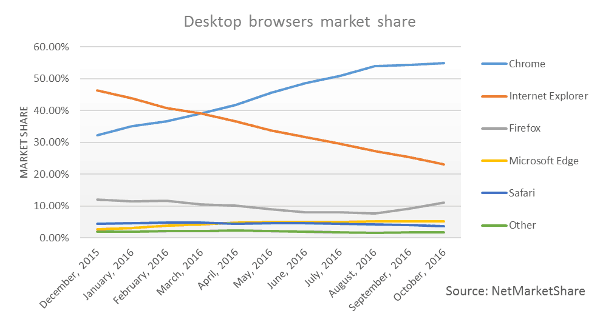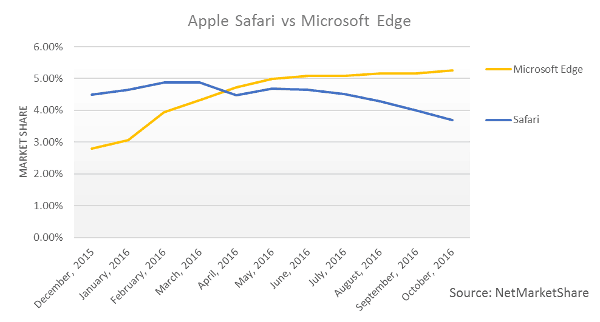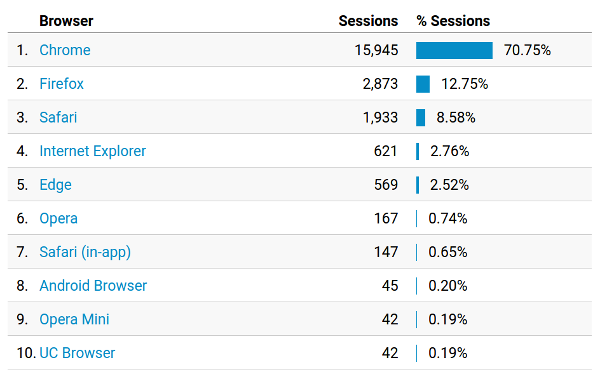Time for a quick reality check when it comes to browsers and WebRTC.
I know you’ve been dying for Apple to support WebRTC in Safari. I am also aware that without WebRTC in your Microsft Internet Explorer 6 that you have deployed in your contact center there is no way for WebRTC to become ubiquitous or widely adopted. But hear me out please.
Browsers market share
The recent update by NetMarketShare on the desktop browsers market share is rather interesting:

It shows the trend between the various desktop browsers for the last year or so.
Here are some things that comes to mind immediately:
- Google Chrome now has 55% market share. Its rise has stalled somewhat in the last couple of months
- Microsoft Internet Explorer is still free falling. It will probably stop somewhere at 10% or so if you ask me
- While Chrome gained the most users from Internet Explorer, it seems that Firefox has picked up users from Internet Explorer in the past two months
- Microsoft Edge gained very little from the demise of Microsoft Internet Explorer. People who have adopted Windows 10 aren’t adopting Edge and are most probably opting to install and use Chrome or Firefox instead. I’ve mentioned it here in the past
What happens between Microsoft Edge and Apple Safari is even more interesting. Apple Safari is falling behind Microsoft Edge:

Something doesn’t add up here.
The Edge numbers should rise a lot higher, due to the successful upgrades we’ve seen for Windows 10 in the market. And it doesn’t. We already noticed how Chrome and to some extent Firefox enjoyed that switch to Windows 10.
I am not sure how the slip of Apple Safari market share from almost 5% in the beginning of this year to below 4% can be explained. Is it due to the slip in Mac sales in recent months or is it people who prefer using Chrome or Firefox on their Macs?
–
There’s one caveat here of course – these numbers are all statistics, and statistics do tend to lie. When going to specific countries, there will be a different spread across browsers, and to a similar extent, your service sees a different type of browser spread because your users are different. Here’s the stats from Google Analytics for this blog:

For me, it is titled towards browsers supporting WebRTC, and Safari is way higher than Edge and Internet Explorer put together.
Back to WebRTC
Every once in a while, someone would stand up and ask: “But what about Internet Explorer?” when I talk about WebRTC. It is becoming one of these questions I now expect.
Here’s what you need to think about and address:
- Chrome is probably your go-to browser and the first one to support with your WebRTC product
- Firefox comes next, and growing. So keep your tabs on it to see how it “performs” with your product
- Edge. Useless for most. Add support to it if:
- You do voice only (should work nicely), and you want that extra market share
- You know for sure your users are on Edge
- Internet Explorer. Ignore
- Microsoft probably won’t invest in having WebRTC support in it, so don’t wait for them
- Use a plugin or whatever if you must
- Safari. Ignore for now. Nothing to do about it anyway
What’s next?
I am working on a quick cheat sheet for you. One which will enable you to make fast decisions for browser support. It will extend also into apps and mobile. Probably by next week.
Until then, if you plan on picking up browsers to support, think of your target audience first. Don’t come up with statements like “IE must be supported” or “Without Safari I can’t use this technology”. You are just hurting yourself this way.

Thanks Tsahi, interesting conclusion I can agree with.
Any opinion on mobile browsers since your post in 2015? Safari here has a more prominent share due to iOS devices. Going native/hybrid is not always a viable choice.
Stephane,
Sure. In general, in iOS strive to build an app. It isn’t as if you have any choice in that matter at the moment. I am working on a cheat sheet type of a document that will cover all of these aspects. If all goes well, it will get published next week.
It’s not that bad with MS Edge in terms of video, H.264 AVC support has arrived, so you can use it now, we are adding video calling support in Edge at the moment
Alexey,
I wonder – did you see real demand in the market for Edge support or is it just to add as a differentiator in your domain and market?
Is Brendan Eich’s Brave browser being detected as Firefox? Perhaps that explains the uptick for Firefox?
Somehow, I don’t believe Brave contributed real numbers. We have billions of browsers out there. To get to 1% market share you really need to get millions of active users.
This market is enough big so is not really a big deal that someone somehow ! they don’t want to support this great technology.
Hi There,
We are trying to implement video conference in our application.
Will WebRTC supports IE and Safari browsers now? So far Chrome alone is working. IE and Safari are not working.
Cheers,
VJ
Don’t expect IE support. Safari support is limited at the moment to H.264 for the video codec.